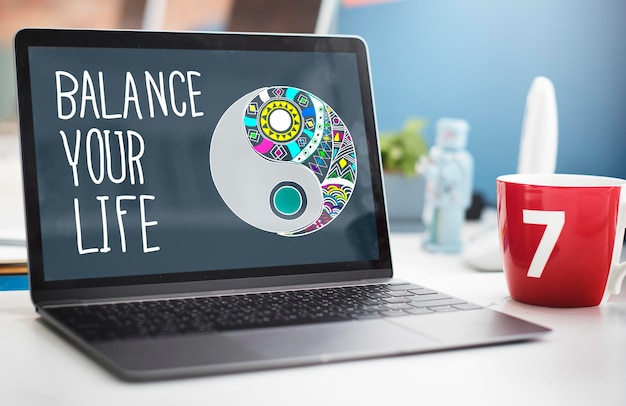
Are you struggling to find a work-life balance? Do you feel like you're always working and never have time for yourself? If so, don't worry; you're not alone. A lot of people struggle with this issue. But fortunately, there are things you can do to improve your work-life balance. We all want a better work-life balance, but achieving it's not always easy. Here are eleven tips to help you find a better balance and improve your quality of life.
Work-life balance is the state of harmony between your work and personal life. It means having enough time for both work and leisure activities and feeling good about the time you spend on each.
We all know the feeling of being overwhelmed by work and not having enough time for our personal lives. Or, on the other hand, spending too much time on leisure activities and not getting enough job done. Work-life balance means finding a healthy equilibrium between the two.
Achieving work-life balance is important for several reasons. First, it can improve your mental and physical health. When stressed out, your body releases the hormone cortisol, leading to several health problems, including anxiety, depression, high blood pressure, and insomnia.
Second, work-life balance can improve your work performance. When you're well-rested and have a healthy mind and body, you're better able to focus and be productive.
Third, work-life balance can improve your relationships. When you have more time for your friends and family, you can strengthen those bonds and build deeper, more meaningful relationships.
Fourth, work-life balance can give you a sense of satisfaction and well-being. When you have a healthy balance between work and play, you're more likely to feel happy and fulfilled.
Here are eleven tips to help you find a better balance and improve your quality of life:

Establishing clear boundaries between work and personal time is essential to achieving a healthy work-life balance. Without these boundaries in place, it can be difficult to fully rejuvenate yourself during your time off, leading to increased feelings of stress and burnout.
One effective way to set these boundaries is by creating a structured schedule that delineates your work hours from your time. Whether you use a digital calendar or old-fashioned paper planners, making your plan explicit will help you resist the urge to reach for your phone or computer.
Additionally, it's important to take steps to limit the number of distractions you face throughout the day. Turn off notifications on your phone, avoid reaching for your email every time it pings, and stay out of social media during work hours.
By setting firm limits on how you spend your professional and personal time, you can achieve that much-needed sense of balance and well-being in all areas of your life.
One of the best ways to achieve work-life balance is to ensure you're taking care of yourself mentally and physically. That means taking time out of each day to do things that make you happy, whether reading a book, taking a walk, or listening to music.
It's also important to eat healthily and exercise regularly. When you take care of your body, you'll have more energy and focus on your work.
And, finally, don't forget to get enough sleep! Most adults need between 7 and 8 hours of sleep each night. When you're well-rested, you'll be able to approach your work with fresh eyes and a clear head.
In today's busy world, it's impossible to do everything on your own. Learning to delegate responsibility and ask for help when needed is crucial to achieving work-life balance.
Start by making a list of all the tasks.
Between work deadlines, family commitments, social obligations, and a host of other demands on our time and energy, it's easy to feel overwhelmed and overstretched. But one way to improve your work-life balance is to delegate tasks whenever possible.
By offloading some of your responsibilities to others, whether delegating more tasks at work or enlisting family members to help out around the house, you will find that you can devote more time and attention to the things that matter most.
It will increase your productivity at work and make you a happier, more well-rounded person overall; it will also give you the freedom to engage in healthy activities like exercise or spending quality time with loved ones. So if you're looking for ways to improve your work-life balance, don't hesitate to ask for help! Your mind and body will thank you in the long run.
When trying to achieve work-life balance, it's important to set realistic goals for your professional and personal life. Trying to do too much can lead to feelings of overwhelm and burnout, so it's important to be realistic about what you can reasonably achieve.
Start by closely examining your schedule and identifying areas where you may be over or under-committed. If you find that you're trying to juggle too many balls, see if there are any tasks you can delegate or eliminate. On the other hand, if you have more free time than you know what to do with, consider adding in a new activity or commitment that you're passionate about.
Finding a balance that works for you and your lifestyle is key. By setting realistic goals, you'll be able to achieve a sense of balance that feels sustainable in the long run.
Learn how to say no. It's a simple two-letter word, but it's one of the most important tools you have at your disposal when achieving work-life balance.
Saying no doesn't mean you're bad; it just means setting boundaries and prioritizing your time and energy. When trying to achieve work-life balance, it's important to be selective about your commitments, both at work and in your personal life.
Otherwise, you'll quickly find yourself spread too thin and feeling overwhelmed.
So next time you're asked to take on a new project at work or commit to an activity you're not sure you have time for, don't be afraid to say no. It's the best way to protect your time and energy so you can focus on the things that matter most.
Maintaining a healthy work-life balance is essential for overall well-being and happiness. To achieve this balance, it is important to prioritize your health and well-being above all else. It might mean getting enough sleep, eating a nutritious diet, or finding time to exercise regularly.
It also means investing in strategies to reduce stress and manage any additional demands that may come up at work or home. By making your health a top priority, you can ensure that you always have the physical, mental, and emotional resources needed to keep your work and personal commitments in balance.
So whether you're looking for better productivity at work or just a little more peace of mind at home, consider some key strategies for prioritizing your health first. After all, you deserve nothing but the best when enjoying a happy and successful life!
Taking breaks throughout the day is important to recharge and refocus when trying to achieve work-life balance. Breaks can be anything from a quick walk around the block to a longer vacation.
It's important to use your breaks wisely, not just use them as an excuse to procrastinate. Leaves are most effective when they're used to reenergize and refocus on the task at hand.
So next time you're feeling overwhelmed or burned out, take a break! It might be just what you need to get back on track and achieve a work-life balance.
Achieving a work-life balance doesn't mean sacrificing all of your fun and free time. Making time for enjoyable activities can help you feel more balanced and fulfilled.
So whether you enjoy spending time with friends and family, pursuing a hobby, or just relaxing at home, schedule some time for fun! It will do wonders for your work-life balance.
Investing in our relationships is one of the most important things we can do for ourselves regarding work-life balance. Whether nurturing our closest bonds with friends and family or cultivating new connections at work or in our social lives, maintaining positive relationships is key to overall well-being.
A lack of strong personal relationships can lead to feelings of isolation, loneliness, and anxiety. These negative emotions can have a serious impact on work-life balance.
That's why it's so important to invest in relationships, both personal and professional. Strong relationships provide support, understanding, and connection, which are vital for achieving work-life balance.
That is why investing in your relationships is important – not only with your family and friends but also with your coworkers and colleagues.
By fostering these bonds, you can create a strong support system that will help you navigate life's challenges and ensure you always have someone to lean on.
Whether simply sharing a cup of coffee with a coworker during a busy day or organizing social events for your team after hours, investing in relationships can give you the boost you need to maintain a healthy work-life balance throughout all the ups and downs of life.
So, take the time today to strengthen those connections and reap the rewards of a better work-life balance tomorrow.
When trying to achieve work-life balance, it's important to make time for our loved ones. Family members can provide much-needed support and understanding, especially during stress.
But it's not always easy to find the time to invest in our relationships with family members. With busy work schedules and packed social calendars, finding quality time to spend together can be tough.
That's why it's important to get creative and make the most of your time. Whether scheduling regular family dinners or planning weekend outings together, making time for those who matter most will help you feel more balanced and fulfilled.
When it comes to work-life balance, sometimes we need a little help from our friends. If you're struggling to find balance in your life, don't be afraid to seek professional help.
Many professionals specialize in work-life balance and can offer valuable insight and guidance. These experts can help you assess your current situation, identify areas of improvement, and develop a plan to achieve work-life balance.
If you're feeling overwhelmed or struggling to find balance in your life, don't hesitate to reach out for help. A little guidance from a professional can go a long way in achieving the work-life balance you desire.

There are many benefits to be gained from achieving a good work-life balance. When we feel balanced, we can approach our work more focus and energy. We're also better able to manage stress at work and in our personal lives.
Achieving work-life balance can also lead to improved physical health. When we're able to manage our stress levels and find time for relaxation, we're less likely to experience health problems like headaches, insomnia, and heart disease.
Finally, work-life balance can lead to greater happiness and satisfaction in our personal and professional lives. When we feel like we have a good handle on our commitments, we're free to enjoy our leisure time and pursue our goals more enthusiastically. We're also more likely to feel proud of our accomplishments and fulfilled by our work.
Expansion Sales & Marketing Culture Organization Digital Strategy Technology Change Management Operations Revenue Growth Data & Analytics Acquisition Innovation